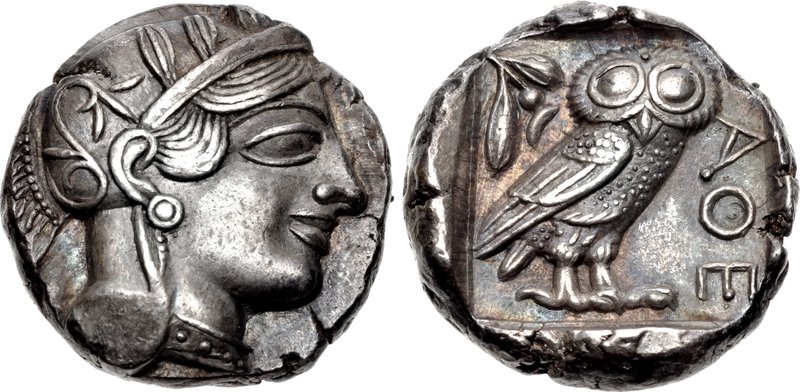When war seemed assured between Sparta and Athens, each planned their strategies based on their perceived strengths pitted against their adversaries weaknesses.
Sparta, a military monoculture, was unmatched on the battlefield. If the contest could be restricted to a one-battle resolution, typical of Greeks of the time, Sparta would be an overwhelming favorite. In addition, her armed hoplites outnumbered the Athenians more than two to one. If the Athenians refused to fight out in the open, and stayed behind their walls, a siege and raiding the country side might eventually decide the matter.
The Athenians strength was two fold. Built on rocky terrain, Athens had a thriving seaborne commerce, as well as her protective walls. Waiting out the Spartans, with raids afar from the sea, could also possibly give Athens the laurels of victory . That was Pericles idea. A key component of this strategy was Athens silver wealth. To ship in her needs, hard currency was crucial.

Sparta, a military monoculture, was unmatched on the battlefield. If the contest could be restricted to a one-battle resolution, typical of Greeks of the time, Sparta would be an overwhelming favorite. In addition, her armed hoplites outnumbered the Athenians more than two to one. If the Athenians refused to fight out in the open, and stayed behind their walls, a siege and raiding the country side might eventually decide the matter.
The Athenians strength was two fold. Built on rocky terrain, Athens had a thriving seaborne commerce, as well as her protective walls. Waiting out the Spartans, with raids afar from the sea, could also possibly give Athens the laurels of victory . That was Pericles idea. A key component of this strategy was Athens silver wealth. To ship in her needs, hard currency was crucial.
In 431 BC the annual income of Athens was about 1,000 silver talents, of which 400 came from internal revenue and 600 from the tribute and other imperial sources.
(A talent represented a specified weight in silver...(and) one talent was the cost of paying the crew of a warship for a month, that there were 6,000 drachmas in a talent, and that one drachma was a good day's pay for a skilled Athenian craftsman.)
Although about 600 talents were available for the cost of the war each year, that amount would not be sufficient to sustain the Periclean plan. Athens would also have to dip into her capital, and here, too, she was uniquely well provided. At the beginning of the war the Athenian treasury held 6,000 talents of coined silver, another 500 in uncoined gold and silver, and 40 talents worth of gold plating that covered the statue of Athena on the Acropolis and could be removed and melted down in an emergency. Against this extraordinary wealth the Peloponnesians (Sparta's coalition) were no match. Pericles was justified in telling the Athenians that "the Peloponnesians have no money, either public or private". This was also true of most of her allies, and although the Corinthians were better off than the others, they had no reserve fund.
Don Kagan, The Peloponnesian War
(A talent represented a specified weight in silver...(and) one talent was the cost of paying the crew of a warship for a month, that there were 6,000 drachmas in a talent, and that one drachma was a good day's pay for a skilled Athenian craftsman.)
Although about 600 talents were available for the cost of the war each year, that amount would not be sufficient to sustain the Periclean plan. Athens would also have to dip into her capital, and here, too, she was uniquely well provided. At the beginning of the war the Athenian treasury held 6,000 talents of coined silver, another 500 in uncoined gold and silver, and 40 talents worth of gold plating that covered the statue of Athena on the Acropolis and could be removed and melted down in an emergency. Against this extraordinary wealth the Peloponnesians (Sparta's coalition) were no match. Pericles was justified in telling the Athenians that "the Peloponnesians have no money, either public or private". This was also true of most of her allies, and although the Corinthians were better off than the others, they had no reserve fund.
Don Kagan, The Peloponnesian War


Comment